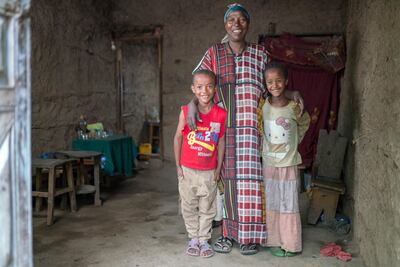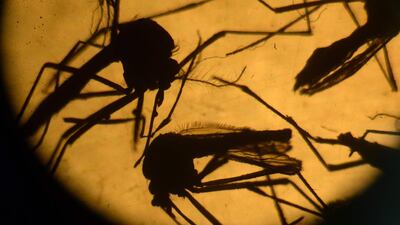In December, the Cop28 world stage hosted a coalition of African leaders and global donors who, together with the UAE, pledged more than $777 million towards combating neglected tropical diseases (NTDs).
It was a landmark moment, bringing an international spotlight to bear on a group of diseases that have long been overlooked in global health priorities, yet affect more than a billion people worldwide.
NTDs are a diverse group of diseases that are largely preventable and treatable. Spread by worms and insects, these 21 diseases blind, disable and disfigure people living in some of the most impoverished corners of the world, perpetuating cycles of disease, stigma and poverty.
A shared lack of funding and attention has bound these diseases together. Today, led by endemic countries and partners, including the UAE, this is changing. Efforts to end NTDs are bearing fruit.
By 2023, 50 countries had stamped out at least one NTD, and more were on their way. Worldwide, 88 million fewer people require treatment for NTDs compared to 2013 – a remarkable win that reflects decades of country-led work and investments.
These gains have been hard-won. But climate change now threatens to reverse them, endangering decades of global health and development progress, and leaving vulnerable communities at risk.
There are gaping holes in our knowledge of how climate change affects many NTDs
NTDs are highly vulnerable to climatic changes, and even small fluctuations can trigger a surge in disease transmission. For instance, changes in temperature and rainfall affect the breeding and survival rates of mosquitoes, which spread diseases such as dengue.
In 2023, dengue cases came close to a historic high, with over 5 million globally. This is just the tip of what could become an unfolding pandemic of diseases spread by climate-sensitive insects like mosquitoes and ticks.
Africa accounts for over 40 per cent of the global NTD burden and is also the continent most vulnerable to the affects of a warming planet. To ensure progress against NTDs is not lost in the face of climate change, we must galvanise the political, technical and financial resources needed to stay the course.
To begin, we need more and better data to inform policymaking and resource allocation. Recent work carried out by the World Health Organisation, with support from Reaching the Last Mile, showed there are gaping holes in our knowledge of how climate change affects many NTDs. Sustained investment to help close these gaps, and shape climate mitigation and adaption strategies is a critical concern.
This must also be supported by robust cross-border surveillance systems that can detect and adapt to shifting disease risks. This proactive approach not only curbs the spread of NTDs into new areas, but ensures resources can be used to protect vulnerable communities from emerging health threats.
Second, we need sustained funding and country leadership to help accelerate action against NTDs, before climate change causes us to lose ground. This means investing to build equitable and climate-resilient health systems that can respond to endemic diseases, and shield communities against future health and climate shocks.
The health commitments made at Cop28 reflect the collaborative action we need to deliver a health-centred climate response.
So too does the Reaching the Last Mile Fund, a multi-donor initiative established in 2017 by President Sheikh Mohamed, to combat two NTDs: lymphatic filariasis and onchocerciasis, or river blindness.
At Cop28, the fund expanded from $100 million to a target $500 million, with the ambitious goal of eliminating these two diseases from the entire continent of Africa. This goal builds on the fund’s existing success, which saw it pioneer a blueprint for the elimination of the two NTDs in sub-Sahara Africa.
Since launch, the fund has provided over 100 million treatments and trained 1.3 million health workers. It also played a part in Niger’s journey to eliminate the transmission of river blindness, following decades of country-led investment and effort.
This milestone – once thought to be scientifically impossible in Africa – stands as an example of what can be achieved when countries and partners unite in pursuit of a shared goal.
The next few years represent a tipping point for NTDs. But we have a vital opportunity to unite, act and eliminate NTDs before climate change makes the job even harder. We call on both countries and donors to join us in relegating NTDs to the history books. The time for action is now.
What is Folia?
Prince Khaled bin Alwaleed bin Talal's new plant-based menu will launch at Four Seasons hotels in Dubai this November. A desire to cater to people looking for clean, healthy meals beyond green salad is what inspired Prince Khaled and American celebrity chef Matthew Kenney to create Folia. The word means "from the leaves" in Latin, and the exclusive menu offers fine plant-based cuisine across Four Seasons properties in Los Angeles, Bahrain and, soon, Dubai.
Kenney specialises in vegan cuisine and is the founder of Plant Food Wine and 20 other restaurants worldwide. "I’ve always appreciated Matthew’s work," says the Saudi royal. "He has a singular culinary talent and his approach to plant-based dining is prescient and unrivalled. I was a fan of his long before we established our professional relationship."
Folia first launched at The Four Seasons Hotel Los Angeles at Beverly Hills in July 2018. It is available at the poolside Cabana Restaurant and for in-room dining across the property, as well as in its private event space. The food is vibrant and colourful, full of fresh dishes such as the hearts of palm ceviche with California fruit, vegetables and edible flowers; green hearb tacos filled with roasted squash and king oyster barbacoa; and a savoury coconut cream pie with macadamia crust.
In March 2019, the Folia menu reached Gulf shores, as it was introduced at the Four Seasons Hotel Bahrain Bay, where it is served at the Bay View Lounge. Next, on Tuesday, November 1 – also known as World Vegan Day – it will come to the UAE, to the Four Seasons Resort Dubai at Jumeirah Beach and the Four Seasons DIFC, both properties Prince Khaled has spent "considerable time at and love".
There are also plans to take Folia to several more locations throughout the Middle East and Europe.
While health-conscious diners will be attracted to the concept, Prince Khaled is careful to stress Folia is "not meant for a specific subset of customers. It is meant for everyone who wants a culinary experience without the negative impact that eating out so often comes with."
Emirates Cricket Board Women’s T10
ECB Hawks v ECB Falcons
Monday, April 6, 7.30pm, Sharjah Cricket Stadium
The match will be broadcast live on the My Sports Eye Facebook page
Hawks
Coach: Chaitrali Kalgutkar
Squad: Chaya Mughal (captain), Archara Supriya, Chamani Senevirathne, Chathurika Anand, Geethika Jyothis, Indhuja Nandakumar, Kashish Loungani, Khushi Sharma, Khushi Tanwar, Rinitha Rajith, Siddhi Pagarani, Siya Gokhale, Subha Srinivasan, Suraksha Kotte, Theertha Satish
Falcons
Coach: Najeeb Amar
Squad: Kavisha Kumari (captain), Almaseera Jahangir, Annika Shivpuri, Archisha Mukherjee, Judit Cleetus, Ishani Senavirathne, Lavanya Keny, Mahika Gaur, Malavika Unnithan, Rishitha Rajith, Rithika Rajith, Samaira Dharnidharka, Shashini Kaluarachchi, Udeni Kuruppuarachchi, Vaishnave Mahesh
Roger Federer's record at Wimbledon
Roger Federer's record at Wimbledon
1999 - 1st round
2000 - 1st round
2001 - Quarter-finalist
2002 - 1st round
2003 - Winner
2004 - Winner
2005 - Winner
2006 - Winner
2007 - Winner
2008 - Finalist
2009 - Winner
2010 - Quarter-finalist
2011 - Quarter-finalist
2012 - Winner
2013 - 2nd round
2014 - Finalist
2015 - Finalist
2016 - Semi-finalist
The specs
- Engine: 3.9-litre twin-turbo V8
- Power: 640hp
- Torque: 760nm
- On sale: 2026
- Price: Not announced yet
Water waste
In the UAE’s arid climate, small shrubs, bushes and flower beds usually require about six litres of water per square metre, daily. That increases to 12 litres per square metre a day for small trees, and 300 litres for palm trees.
Horticulturists suggest the best time for watering is before 8am or after 6pm, when water won't be dried up by the sun.
A global report published by the Water Resources Institute in August, ranked the UAE 10th out of 164 nations where water supplies are most stretched.
The Emirates is the world’s third largest per capita water consumer after the US and Canada.
MADAME%20WEB
%3Cp%3EDirector%3A%20S.J.%20Clarkson%3C%2Fp%3E%0A%3Cp%3EStarring%3A%20Dakota%20Johnson%2C%20Tahar%20Rahim%2C%20Sydney%20Sweeney%3C%2Fp%3E%0A%3Cp%3ERating%3A%203.5%2F5%3C%2Fp%3E%0A
The specs
Engine: 3.0-litre six-cylinder turbo
Power: 398hp from 5,250rpm
Torque: 580Nm at 1,900-4,800rpm
Transmission: Eight-speed auto
Fuel economy, combined: 6.5L/100km
On sale: December
Price: From Dh330,000 (estimate)
Martin Sabbagh profile
Job: CEO JCDecaux Middle East
In the role: Since January 2015
Lives: In the UAE
Background: M&A, investment banking
Studied: Corporate finance
UAE currency: the story behind the money in your pockets
COMPANY%20PROFILE
%3Cp%3E%3Cstrong%3ECompany%20name%3A%3C%2Fstrong%3E%20Clinicy%3Cbr%3E%3Cstrong%3EStarted%3A%3C%2Fstrong%3E%202017%3Cbr%3E%3Cstrong%3EFounders%3A%3C%2Fstrong%3E%20Prince%20Mohammed%20Bin%20Abdulrahman%2C%20Abdullah%20bin%20Sulaiman%20Alobaid%20and%20Saud%20bin%20Sulaiman%20Alobaid%3Cbr%3E%3Cstrong%3EBased%3A%3C%2Fstrong%3E%20Riyadh%3Cbr%3E%3Cstrong%3ENumber%20of%20staff%3A%3C%2Fstrong%3E%2025%3Cbr%3E%3Cstrong%3ESector%3A%3C%2Fstrong%3E%20HealthTech%3Cbr%3E%3Cstrong%3ETotal%20funding%20raised%3A%3C%2Fstrong%3E%20More%20than%20%2410%20million%3Cbr%3E%3Cstrong%3EInvestors%3A%3C%2Fstrong%3E%20Middle%20East%20Venture%20Partners%2C%20Gate%20Capital%2C%20Kafou%20Group%20and%20Fadeed%20Investment%3C%2Fp%3E%0A


